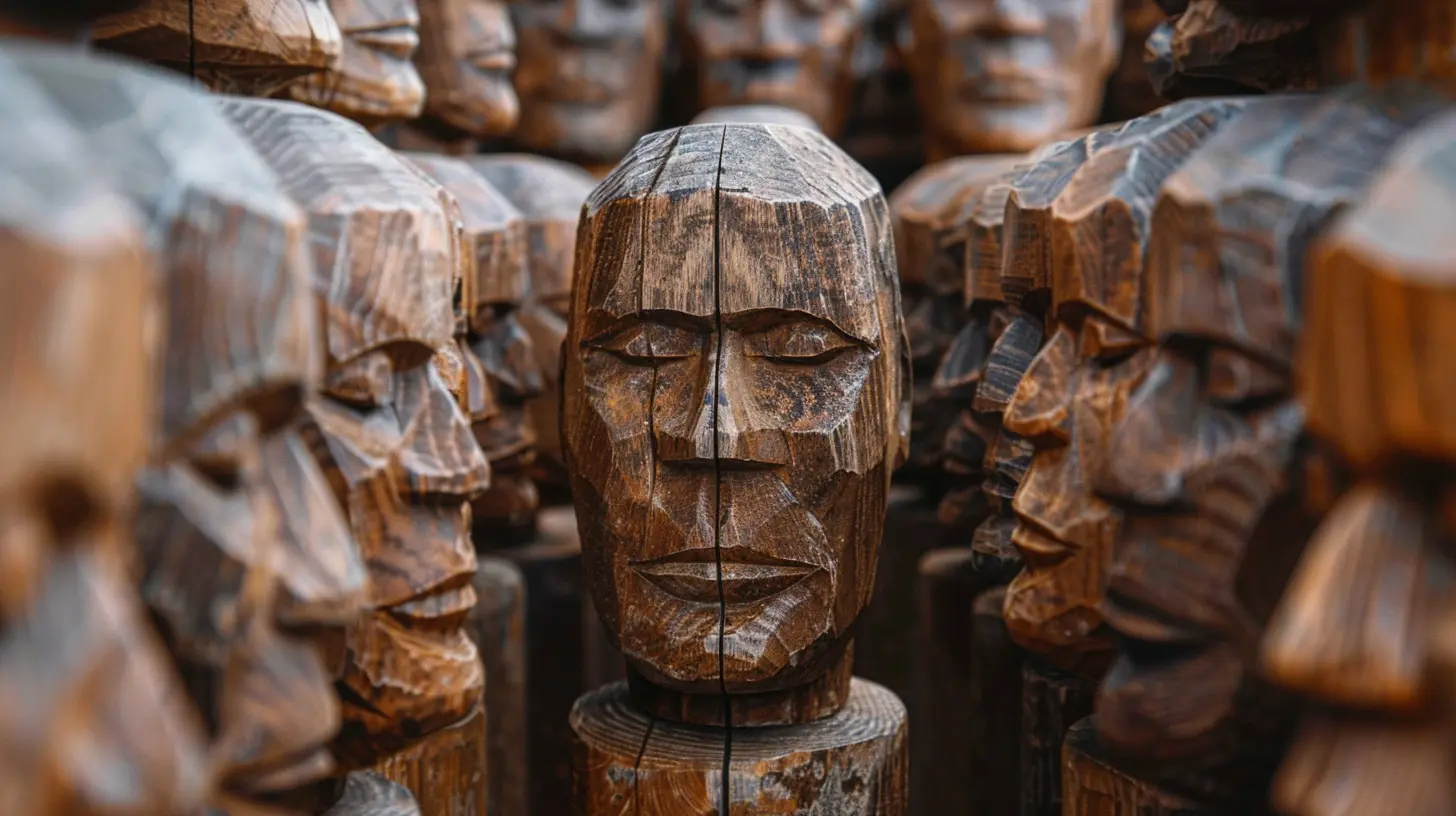The Psychology of Groupthink and Collective Decision Making
3 January 2025
Have you ever been part of a group where everyone seemed to agree on something, even though deep down, you had your doubts? Maybe it was a work meeting, a social gathering, or even a family decision. But here's the thing: you didn’t speak up. Why? Because it felt easier to go along with everyone else, right? Well, that’s a classic example of groupthink at play.
In this article, we’re going to dive deep into the fascinating world of groupthink and collective decision-making. We'll explore why it happens, how it impacts our choices, and what you can do to avoid falling into its trap.

What is Groupthink?
Groupthink is a psychological phenomenon where people in a group strive for consensus to the point that they suppress dissenting opinions. It was first coined by social psychologist Irving Janis in 1972, and it describes the tendency of groups to make decisions that prioritize harmony over critical thinking. Sounds simple, right? But the consequences can be huge.Imagine you’re in a meeting, and everyone seems to agree on a course of action. Even if you think it's a bad idea, you might hesitate to voice your concerns because you don't want to upset the group or seem like the odd one out. Over time, this kind of behavior leads to poor decision-making because alternative viewpoints are never considered. The result? The group makes a decision based on consensus rather than logic or evidence.
How Does Groupthink Happen?
Groupthink happens when a group prioritizes cohesiveness and unity over individual opinions. It operates under the assumption that agreement equals success. But in reality, it can lead to faulty decisions, blind spots, and even disastrous outcomes.Several factors contribute to groupthink:
1. High Group Cohesion: When a group feels tightly bonded, they may prioritize maintaining that bond over critically analyzing ideas.
2. Isolation from Outside Opinions: Groups that don’t seek input from outsiders can become echo chambers, where only one line of thinking is reinforced.
3. Directive Leadership: If a leader dominates the conversation or pushes a specific agenda, members may feel pressured to agree even when they have reservations.
4. Pressure to Conform: Group members might feel explicitly or implicitly pressured to align with the majority opinion, even if they disagree.
The scary part? Groupthink often goes unnoticed until it’s too late. It sneaks up on us, quietly influencing our decisions in the background.

The Impact of Groupthink on Decision Making
Groupthink can be surprisingly dangerous, especially when it comes to making critical decisions. After all, if everyone in the group is on the same page, then there’s no room for alternative perspectives or critical evaluations.Examples of Groupthink Gone Wrong
You’ve probably heard of the Bay of Pigs invasion in 1961, one of the most significant examples of groupthink in history. President John F. Kennedy and his team decided to invade Cuba to overthrow Fidel Castro, but the plan failed spectacularly. Why? Because the group was so focused on maintaining unity and following the leader’s vision that they ignored critical warnings and dissenting voices. The result? A highly flawed decision that led to a national embarrassment.Another example is the space shuttle Challenger disaster in 1986. Engineers had concerns about the O-rings in cold weather, but groupthink led NASA officials to dismiss these warnings, ultimately resulting in the tragic explosion of the shuttle.
The Consequences of Groupthink
When groupthink takes over, it stifles creativity, innovation, and critical analysis. The group becomes more interested in reaching a quick agreement than in making the best decision. Here are some common consequences:- Poor Decision Quality: The group fails to consider all possible solutions or evaluate the risks properly.
- Lack of Accountability: Individuals might hide behind the group, thinking, "Well, everyone else agreed, so it must be a good idea."
- Missed Opportunities: By shutting down alternative viewpoints, the group might overlook better options or innovative solutions.
- Increased Risk of Failure: Without a thorough evaluation, the chances of making a flawed decision rise, leading to significant mistakes.

The Psychology Behind Groupthink
So, why do we fall into the trap of groupthink? Let’s break down the psychological reasons:The Need for Acceptance
Humans are social creatures, and we have an innate desire to belong. When we’re part of a group, we want to fit in, which often means going along with what everyone else thinks. This is where social pressure kicks in. Even if you have a different opinion, the discomfort of standing out might be enough to keep you quiet. After all, who wants to be that person who always rocks the boat?Cognitive Dissonance
The mental discomfort of holding conflicting beliefs can also fuel groupthink. Let’s say you’re sitting in a meeting and the group is leaning toward a decision you disagree with. You might experience cognitive dissonance—that uneasy feeling that your belief doesn’t align with the group’s. To reduce this discomfort, it’s easier to just conform. You’ll convince yourself that maybe the group knows something you don’t, or maybe it’s not worth the fight.The Illusion of Invulnerability
In some groups, especially those with high status or strong leadership, there’s an illusion that the group can do no wrong. Members may believe that because they’re part of an elite team, their decisions are inherently good. This leads to overconfidence, where members ignore warning signs or negative feedback.Self-Censorship
Ever held back an opinion because you didn’t want to ruffle feathers? That’s self-censorship at work. In groupthink, individuals often silence themselves to avoid conflict or judgment. They assume that if no one else is speaking up, then their own thoughts must be wrong or irrelevant.
The Role of Collective Decision Making
Now, let’s balance this conversation. Groupthink may have its downsides, but collective decision-making isn’t always bad. In fact, when done right, it can lead to better outcomes than individual decision-making. The key is to foster an environment where diverse opinions are encouraged and critical thinking is valued.Benefits of Collective Decision Making
When groupthink is avoided, collective decision-making can be incredibly powerful:1. Diverse Perspectives: Groups that encourage open discussion benefit from a variety of viewpoints, which leads to more well-rounded decisions.
2. Shared Knowledge: Each group member brings their unique knowledge and expertise to the table, which can result in more informed decisions.
3. Increased Buy-In: When people feel like they’ve had a say in the decision-making process, they’re more likely to support the final outcome.
How to Foster Healthy Collective Decision Making
So how can we reap the benefits of collective decision-making without falling victim to groupthink? Here are some strategies:- Encourage Dissent: Make it clear that disagreement is not only allowed but encouraged. You can even assign a "devil’s advocate" to challenge the group’s ideas.
- Diverse Group Composition: Include people with different backgrounds, expertise, and viewpoints. Diversity helps to prevent echo chambers.
- Avoid Directive Leadership: A strong leader who pushes their agenda can stifle open discussion. Instead, leaders should facilitate conversation and ensure all voices are heard.
- Seek Outside Opinions: Bringing in fresh perspectives from outside the group can challenge assumptions and bring new ideas to the table.
How to Recognize and Avoid Groupthink
Recognizing groupthink is the first step to avoiding it. Here are some warning signs to look out for:- Illusion of unanimity: If everyone seems to agree too quickly, it’s a red flag that dissenting voices might be getting suppressed.
- Stereotyping dissenters: If the group dismisses or belittles those who disagree, it’s a sign that groupthink is taking hold.
- Pressure to conform: If members feel pressured to go along with the group, they’re less likely to voice their true opinions.
Practical Tips to Combat Groupthink
- Invite Criticism: Actively ask for critiques and opposing viewpoints. This can make group members feel more comfortable sharing their concerns.- Break into Subgroups: Smaller groups are less likely to experience groupthink. Encourage subgroups to brainstorm separately before coming together to discuss ideas.
- Anonymous Feedback: Sometimes, people don’t want to speak up in front of others. Providing an anonymous way for group members to share their thoughts can help ensure that all opinions are heard.
Conclusion
Groupthink is a sneaky psychological phenomenon that can creep into any group decision-making process. While it’s tempting to seek consensus and avoid conflict, the cost of groupthink can be significant. Poor decisions, lack of creativity, and even catastrophic failures can result when dissenting voices are silenced.But it doesn’t have to be this way. By fostering a culture of open dialogue, encouraging dissent, and seeking diverse perspectives, we can harness the power of collective decision-making without falling into the groupthink trap. So, next time you’re in a group, don’t be afraid to speak up. Your voice might just be the one that saves the day!
all images in this post were generated using AI tools
Category:
Psychological ResearchAuthor:

Alexandra Butler
Discussion
rate this article
13 comments
Morrow Ramirez
Groupthink: where originality goes to die and mediocre ideas throw a party! Let’s celebrate the art of blending into the crowd—until someone bravely questions the herd. Dare to be different, or enjoy your ‘safe’ bubble of boredom!
February 3, 2025 at 4:49 PM

Alexandra Butler
Great point! Embracing individuality can spark innovation, while groupthink often stifles it. Questioning the status quo is essential for growth and creativity.
Lorna Sanchez
This article effectively highlights the dangers of groupthink in collective decision-making. It emphasizes the need for diverse perspectives to counteract conformity, yet it could further explore strategies for fostering open dialogue and critical thinking. Addressing power dynamics within groups would enhance our understanding of this pervasive psychological phenomenon.
January 29, 2025 at 5:08 PM

Alexandra Butler
Thank you for your insightful feedback! I appreciate your suggestion to delve deeper into strategies for fostering open dialogue and addressing power dynamics, which are indeed crucial for mitigating groupthink. I'll consider these points for future discussions.
Georgina Reese
Groupthink: where brilliant ideas go to die and everyone nods in unison—because who really wants to be the ‘party pooper’?!
January 27, 2025 at 4:52 AM

Alexandra Butler
Absolutely! Groupthink stifles creativity and critical thinking, leading to conformity over innovation. It's essential to foster an environment where diverse opinions are valued to avoid this pitfall.
Thorne Edwards
This article offers a clear insight into how groupthink can stifle creativity and critical thinking in decision-making. Understanding these dynamics is crucial for fostering healthier dialogue and more effective outcomes in team settings. Well done!
January 21, 2025 at 4:10 PM

Alexandra Butler
Thank you for your thoughtful comment! I'm glad you found the insights on groupthink valuable for promoting better team dynamics.
Linnea Blair
Understanding groupthink is crucial for effective decision-making. By fostering open dialogue and encouraging diverse perspectives, we can break free from conformity, enhancing creativity and achieving better outcomes for all.
January 17, 2025 at 3:50 AM

Alexandra Butler
Thank you for your insightful comment! I completely agree that fostering open dialogue and embracing diverse perspectives are key to overcoming groupthink and improving decision-making. Your emphasis on creativity and collaboration resonates deeply with the article's themes.
Esther McLain
Great insights! Understanding groupthink helps improve decision-making and fosters healthier group dynamics. Thank you!
January 14, 2025 at 5:38 AM

Alexandra Butler
Thank you for your feedback! I'm glad you found the insights on groupthink valuable for enhancing decision-making and group dynamics.
Ava McFarland
Groupthink: where everyone nods along while secretly Googling for answers!
January 11, 2025 at 3:44 AM

Alexandra Butler
Great point! Groupthink can stifle genuine discussion, often leading individuals to seek answers outside the group instead of engaging in critical dialogue.
Loretta Simmons
Insightful perspective on group dynamics!
January 10, 2025 at 4:01 PM

Alexandra Butler
Thank you! I'm glad you found it insightful. Group dynamics play a crucial role in shaping our decisions.
Kestrel McManus
Great insights! It's fascinating how we navigate group dynamics!
January 10, 2025 at 5:01 AM

Alexandra Butler
Thank you! I'm glad you found the insights valuable—group dynamics indeed play a crucial role in decision-making processes.
Evren McIlroy
Groupthink often undermines effective decision-making by prioritizing consensus over critical evaluation. Understanding its psychological mechanisms is essential for fostering healthier group dynamics, encouraging dissent, and ultimately enhancing the quality of collective decisions in various contexts.
January 8, 2025 at 4:55 AM

Alexandra Butler
Thank you for your insightful comment! You're absolutely right—recognizing the mechanisms of groupthink is vital for promoting critical discussion and improving decision-making outcomes in groups.
Lyla Barrett
Great insights on groupthink! Understanding its dynamics is crucial for improving collective decision-making effectiveness.
January 6, 2025 at 5:31 AM

Alexandra Butler
Thank you! I'm glad you found the insights valuable for enhancing decision-making.
Carrie McConkey
This article beautifully captures the nuances of groupthink! It's fascinating how our desire for harmony can cloud judgment. I often find myself torn between contributing my thoughts and aligning with the group—such a relatable struggle in decision-making! Thanks for sharing!
January 4, 2025 at 4:21 AM

Alexandra Butler
Thank you for your thoughtful comment! I'm glad you found the article relatable and that it resonated with your own experiences in decision-making.
Kova Sweeney
Groupthink: where everyone's ideas blend together like a smoothie—deliciously confusing and sometimes a bit chunky!
January 3, 2025 at 4:04 AM

Alexandra Butler
Great analogy! Groupthink can indeed create a mixed outcome, blending diverse ideas but often sacrificing clarity.
MORE POSTS

The Science Behind Lasting Happiness: What Psychology Reveals

Understanding Relationship Anxiety and How to Overcome It

The Role of Emotional Intelligence in Achieving Work-Life Balance

How to Manage Anxiety with Self-Care Practices

How to Embrace Change and Thrive in Uncertainty

How Your Childhood Shapes Your Understanding of Happiness

The Impact of Parental Stress on Child Development

The Science of Learning Through Imitation and Role-Playing

The Role of Gender Roles in Modern Relationships